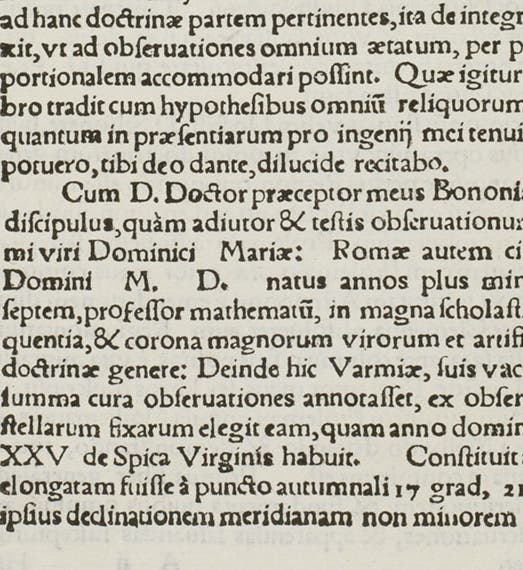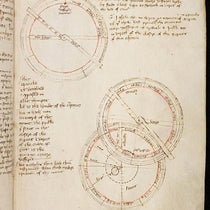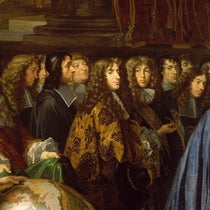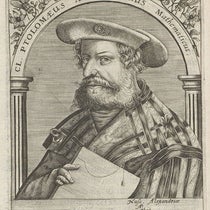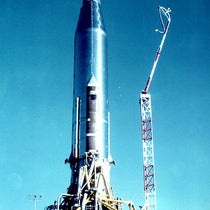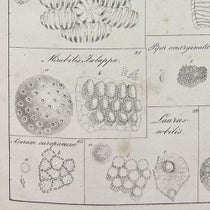Scientist of the Day - Domenico Maria Novara
Domenico Maria Novara, an Italian astronomer/astrologer, was born July 29, 1454. Novara taught astronomy at the University of Bologna, and as was required of nearly all academic astronomers, he issued annual astrological prognostications about the good and bad things that might happen in and to Bologna for that particular year. There is no evidence that in his 1496 prognostication, he predicted the arrival in Bologna of a young law student from Warmia in Poland named Nicolaus Copernicus. Nevertheless, the two hooked up, and Copernicus functioned as Novara's assistant, studying not law, but the heavens, possibly even moving into Novara’s house at some point. What he learned from Novara is not at all clear, although we know they made some observations together, as Copernicus specifically mentioned them in the book he wrote forty years later, De revolutionibus orbius coelestium (1543).
Novara is of interest to historians of Renaissance astronomy because: he was an active astrologer, Copernicus spent some years working with him, and yet there is no mention of astrology in either of Copernicus's astronomical works – the unpublished Commentariolus (before 1514) and the published masterwork, De revolutionibus. Was Copernicus indifferent to astrology? Did he actively reject it? Or was he perhaps interested in astrology after all, but kept it hidden? All of these possibilities have been considered by historians.
Until fairly recently, few historians paid much attention to the political context in which Renaissance astronomers and astrologers found themselves. This has been changing. Novara, for example, wrote prognostications for every year of his employment, and many of these survive, in particular; the ones for 1496-1500, the Copernican years, and they have been recently published. It turns out this was a difficult time to be an astrologer in Italy, especially in Milan and Bologna, because of the Italian Wars, when first Charles VIII of France and then Louis XII came storming down into Italy, capturing Milan and threatening Bologna. Novara had his hands full, trying to make general predictions that would not get him into trouble. In 1500, his prediction of safe times was a disaster. Also, it did not make matters easier when Giovanni Pico della Mirandola's diatribe against astrology was posthumously published in 1496, and Novara had to defend not only his predictions, but the science itself. Is it possible that Copernicus observed the problems that astrology brought to Novara and decided to steer clear in his own work? We don't know.
One of the few mentions of Novara in contemporary print occurs in the Narratio prima – the first announcement of the Copernican system – written by Georg Joachim Rheticus and published in Gdansk in 1540. There Rheticus says:
My teacher made observations with the utmost care at Bologna, where he was not so much the pupil as the assistant and witness of observations of the learned Domenico Maria .
Not many libraries can show you the original Latin text, because the Narratio prima is quite scarce, but the Linda Hall Library can, and we show it here as our first image.
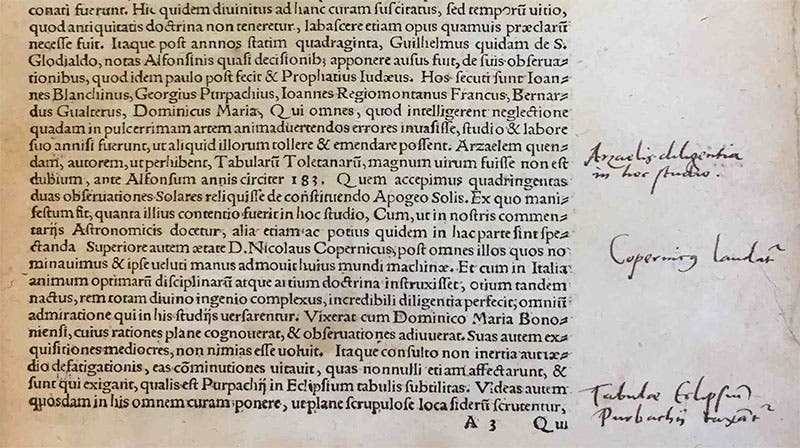
Text mentioning that Copernicus lived with Domenico Maria Novara in Bologna, detail of first page of introduction in George Joachim Rheticus, Ephemerides novae, 1550 (Austrian National Library, Vienna, photo by Karl Galle)
Rheticus mentioned Novara in one other work, his Ephemerides novae (1550), which is our only source for the fact that Copernicus lived with Novara for an unspecified length of time. Rheticus doesn’t mention Novara’s house, so we take some liberties when we say Copernicus actually moved in. But I wanted to show you the page that contains that statement, from a special copy. We do not own the Ephemerides, but the Austrian National Library in Vienna holds a copy that Rheticus presented to the Czech astronomer Thaddeus Hagecius ab Hayek, and it contains Hagecius’s annotations, including, in the margin of the first page of the introduction, the phrase, Copernicus laudatur, “Copernicus praised” (second image). Just a few lines further down, in the printed text, you can make out: Vixerat cum Dominico Maria Bononiensi, “he lived with Domenico Maria of Bologna.” Karl Galle, a Copernican scholar and former Library fellow, took this photo in Vienna and graciously shared it with us. He also corrected some inaccuracies in an early draft of this post.
It is interesting to realize that, without these two sentences from Rheticus, in his Narratio prima and Ephemerides novae, our knowledge of Copernicus's stay at Bologna, and his relationship with Novara, would be much slimmer.
Dr. William B. Ashworth, Jr., Consultant for the History of Science, Linda Hall Library and Associate Professor emeritus, Department of History, University of Missouri-Kansas City. Comments or corrections are welcome; please direct to ashworthw@umkc.edu.

